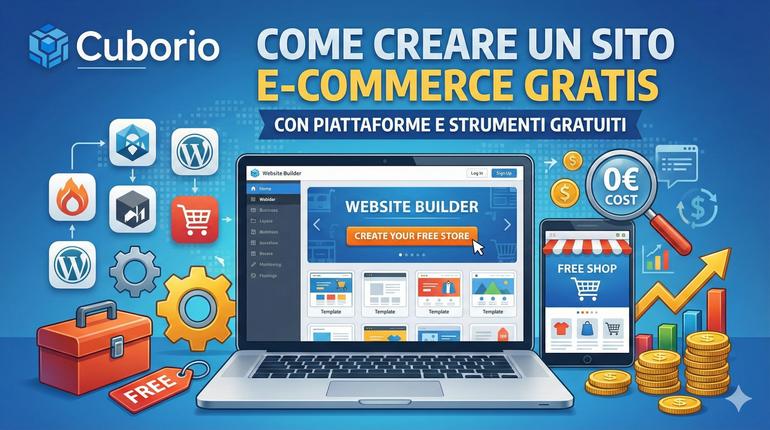
15 Jul
How to create a free e-commerce website
For over 20 years, e-commerce has seen exponential growth, becoming a fundamental sales channel for many companies thanks to its flexibility and the numerous opportunities it offers, but above all because it helps to significantly increase company turnover.
If you are thinking of creating a free e-commerce website for your business, you may be interested in finding out how to do it yourself by following our information on the pros and cons of this choice.
Introduction to e-commerce
Before delving into the creation of a free e-commerce site, it is important to understand the importance of having an online business in today's world. E-commerce allows businesses to reach a diverse audience spread across the globe, enabling them to sell products or services anytime, anywhere, thereby increasing sales, brand visibility and customer loyalty.
Creating a free e-commerce website may seem like an attractive solution for many small businesses or new entrepreneurs who want to start selling online without investing too much, but it is important to be aware of the pros and cons of this choice.
The pros of free e-commerce
- Zero cost: the main attraction of free e-commerce is that it requires no initial investment. You can start selling online without having to purchase a domain, pay for a hosting plan or invest in e-commerce software.
- Ease of use: Many free e-commerce platforms offer intuitive, easy-to-use tools for creating and managing your online shop. No advanced technical knowledge is required to start your e-commerce business.
- Scalability: Even if you start with a free e-commerce platform, many of them offer upgrade options to paid plans that allow you to expand your online shop as you grow.
The cons of free e-commerce
- Limited features: Free e-commerce platforms often offer basic features and may have limitations on the number of products you can sell or the options for customising your shop. This could limit your ability to provide an optimal shopping experience for your customers.
- Limited support: With free e-commerce, you may not have access to dedicated customer support as you would with a paid plan. This could make it more difficult to resolve any technical issues or get personalised assistance.
- Lack of branding: Many free e-commerce platforms may display advertisements or branding from the platform itself on your site. This could compromise your brand image and confuse your customers.
- Lack of control: With free e-commerce, you may not have full control over your business operations. You may be limited in your payment options, marketplace integrations, or site customisations.





